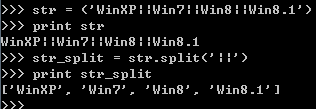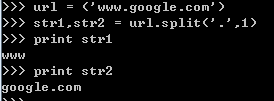Python进阶---python strip() split()函数实战(转)
先看一个例子:
>>> ipaddr = 10.122.19.10 File "", line 1 ipaddr = 10.122.19.10 ^ SyntaxError: invalid syntax >>> ipaddr = "10.122.19.10" >>> ipaddr.strip() '10.122.19.10' >>> ipaddr = '10.122.19.10' >>> ipaddr.strip() '10.122.19.10' >>> ipaddr.split('.') ['10', '122', '19', '10'] >>> ipaddr.strip().split('.') ['10', '122', '19', '10'] >>>
python strip()函数 介绍
函数原型
声明:s为字符串,rm为要删除的字符序列
s.strip(rm) 删除s字符串中开头、结尾处,位于 rm删除序列的字符
s.lstrip(rm) 删除s字符串中开头处,位于 rm删除序列的字符
s.rstrip(rm) 删除s字符串中结尾处,位于 rm删除序列的字符
注意:
1. 当rm为空时,默认删除空白符(包括'\n', '\r', '\t', ' ')
例如:
>>> a = ' 123' >>> a.strip() '123' >>> a='\t\tabc' 'abc' >>> a = 'sdff\r\n' >>> a.strip() 'sdff'
2.这里的rm删除序列是只要边(开头或结尾)上的字符在删除序列内,就删除掉。
例如 :
>>> a = '123abc' >>> a.strip('21') '3abc' 结果是一样的 >>> a.strip('12') '3abc'
Python Split函数的用法总结(
字符串的split用法
说明:
Python中没有字符类型的说法,只有字符串,这里所说的字符就是只包含一个字符的字符串!!!
这里这样写的原因只是为了方便理解,仅此而已。
1.按某一个字符分割,如‘.’
1 str = ('www.google.com') 2 print str 3 str_split = str.split('.') 4 print str_split
结果如下:
1 str = ('www.google.com') 2 print str 3 str_split = str.split('.',1) 4 print str_split
结果如下:
3.按某一字符串分割。如:‘||’
1 str = ('WinXP||Win7||Win8||Win8.1') 2 print str 3 str_split = str.split('||') 4 print str_split
结果如下:

4.按某一字符串分割,且分割n次。如:按‘||’分割2次
1 str = ('WinXP||Win7||Win8||Win8.1') 2 print str 3 str_split = str.split('||',2) 4 print str_split
5.按某一字符(或字符串)分割,且分割n次,并将分割的完成的字符串(或字符)赋给新的(n+1)个变量。(注:见开头说明)
如:按‘.’分割字符,且分割1次,并将分割后的字符串赋给2个变量str1,str2
1 url = ('www.google.com') 2 str1, str2 = url.split('.', 1) 3 print str1 4 print str2
一个正则匹配的例子:
>>> str="xxxxxxxxxxxx5 [50,0,50]>,xxxxxxxxxx"
>>> lst = str.split("[")[1].split("]")[0].split(",")
>>> print lst
['50', '0', '50']
分解如下
>>> list =str.split("[") 按照左边分割
>>> print list
['xxxxxxxxxxxx5 ', '50,0,50]>,xxxxxxxxxx']
>>> list =str.split("[")[1].split("]") 包含的再按右边分割
再对所要的字符串按照分割副 存放在列表中
>>> list
['50,0,50', '>,xxxxxxxxxx']
>>> str.split("[")[1].split("]")[0]
'50,0,50'
>>> str.split("[")[1].split("]")[0].split(",")
['50', '0', '50']










【推荐】国内首个AI IDE,深度理解中文开发场景,立即下载体验Trae
【推荐】编程新体验,更懂你的AI,立即体验豆包MarsCode编程助手
【推荐】抖音旗下AI助手豆包,你的智能百科全书,全免费不限次数
【推荐】轻量又高性能的 SSH 工具 IShell:AI 加持,快人一步
· 记一次.NET内存居高不下排查解决与启示
· 探究高空视频全景AR技术的实现原理
· 理解Rust引用及其生命周期标识(上)
· 浏览器原生「磁吸」效果!Anchor Positioning 锚点定位神器解析
· 没有源码,如何修改代码逻辑?
· 全程不用写代码,我用AI程序员写了一个飞机大战
· MongoDB 8.0这个新功能碉堡了,比商业数据库还牛
· 记一次.NET内存居高不下排查解决与启示
· DeepSeek 开源周回顾「GitHub 热点速览」
· 白话解读 Dapr 1.15:你的「微服务管家」又秀新绝活了